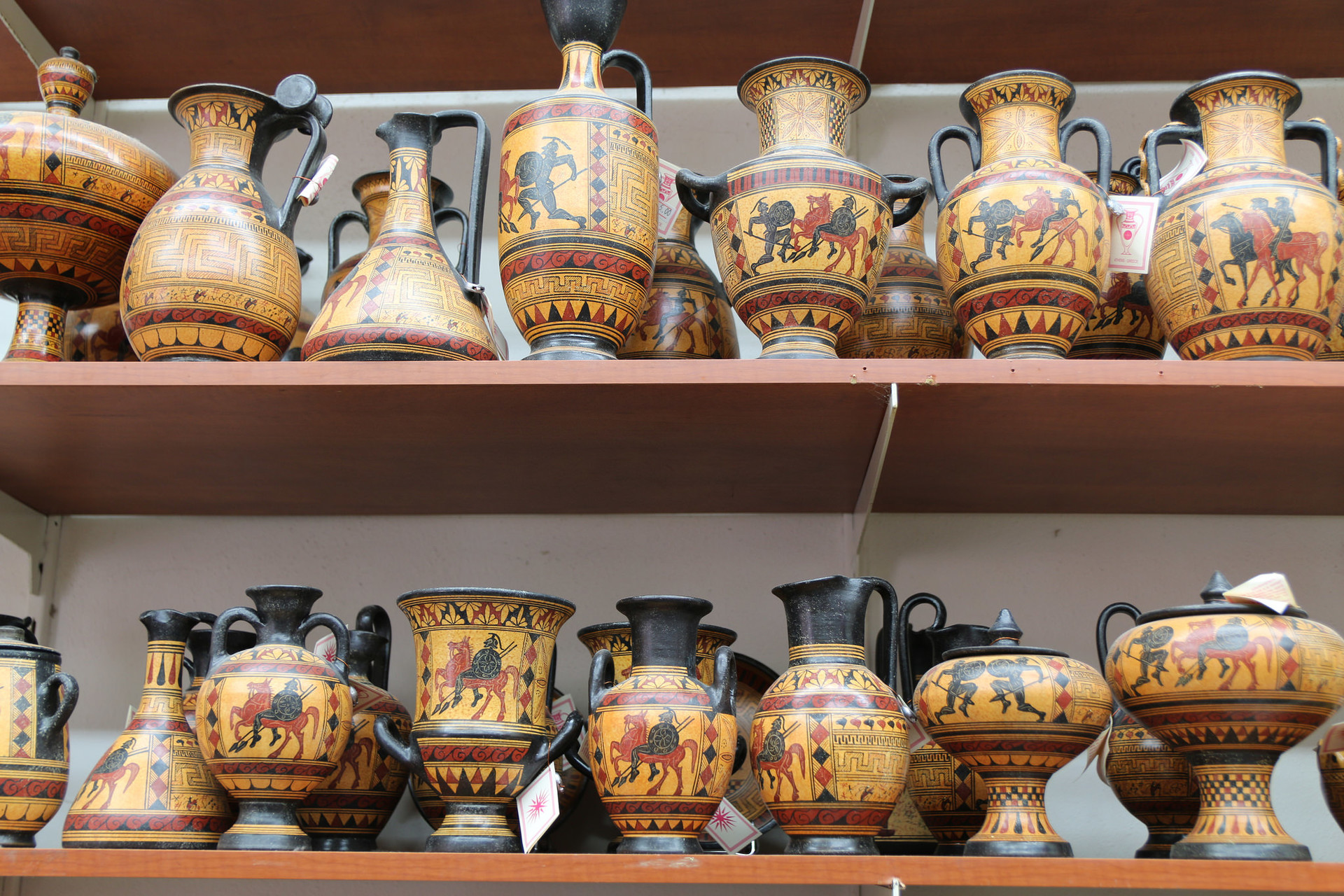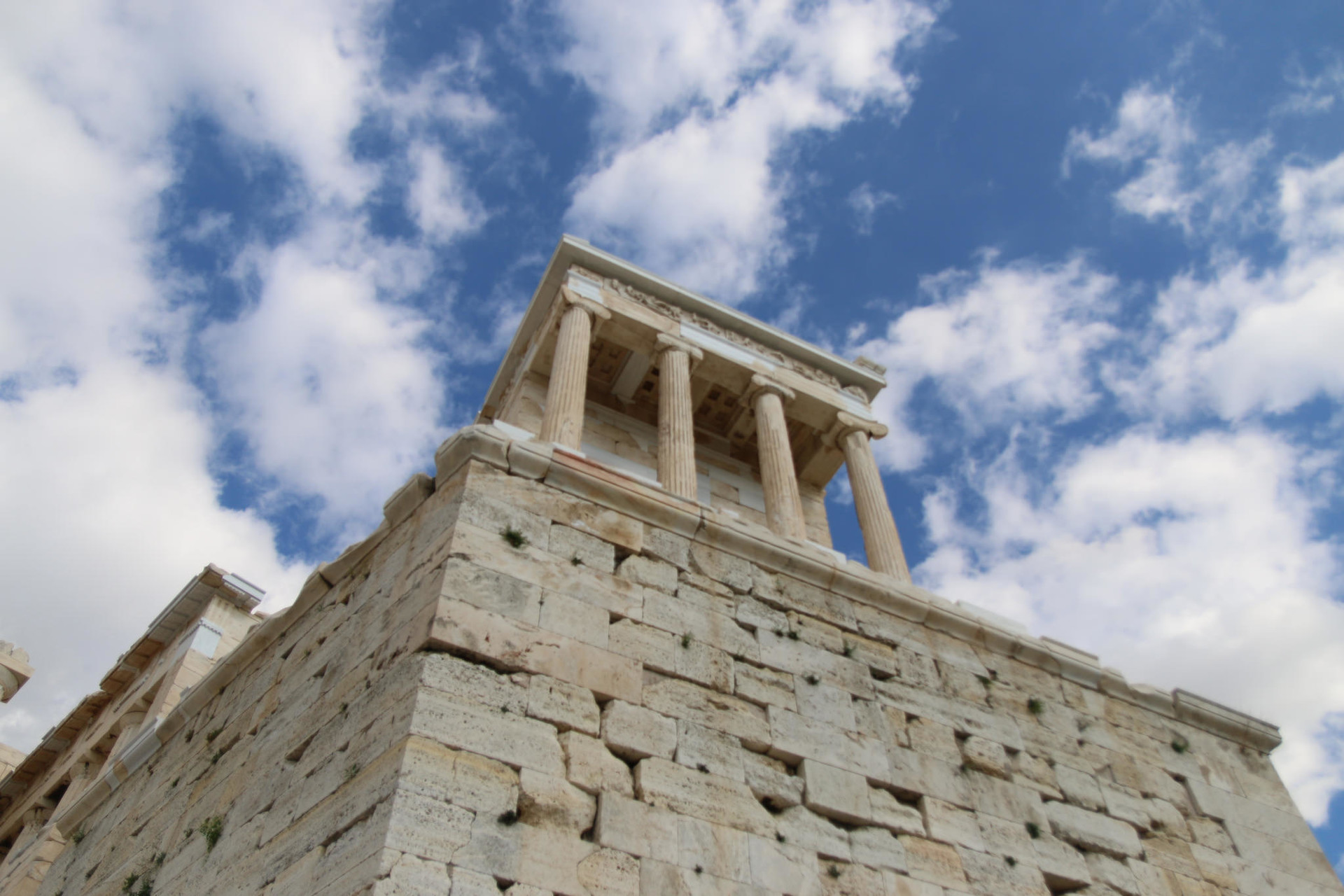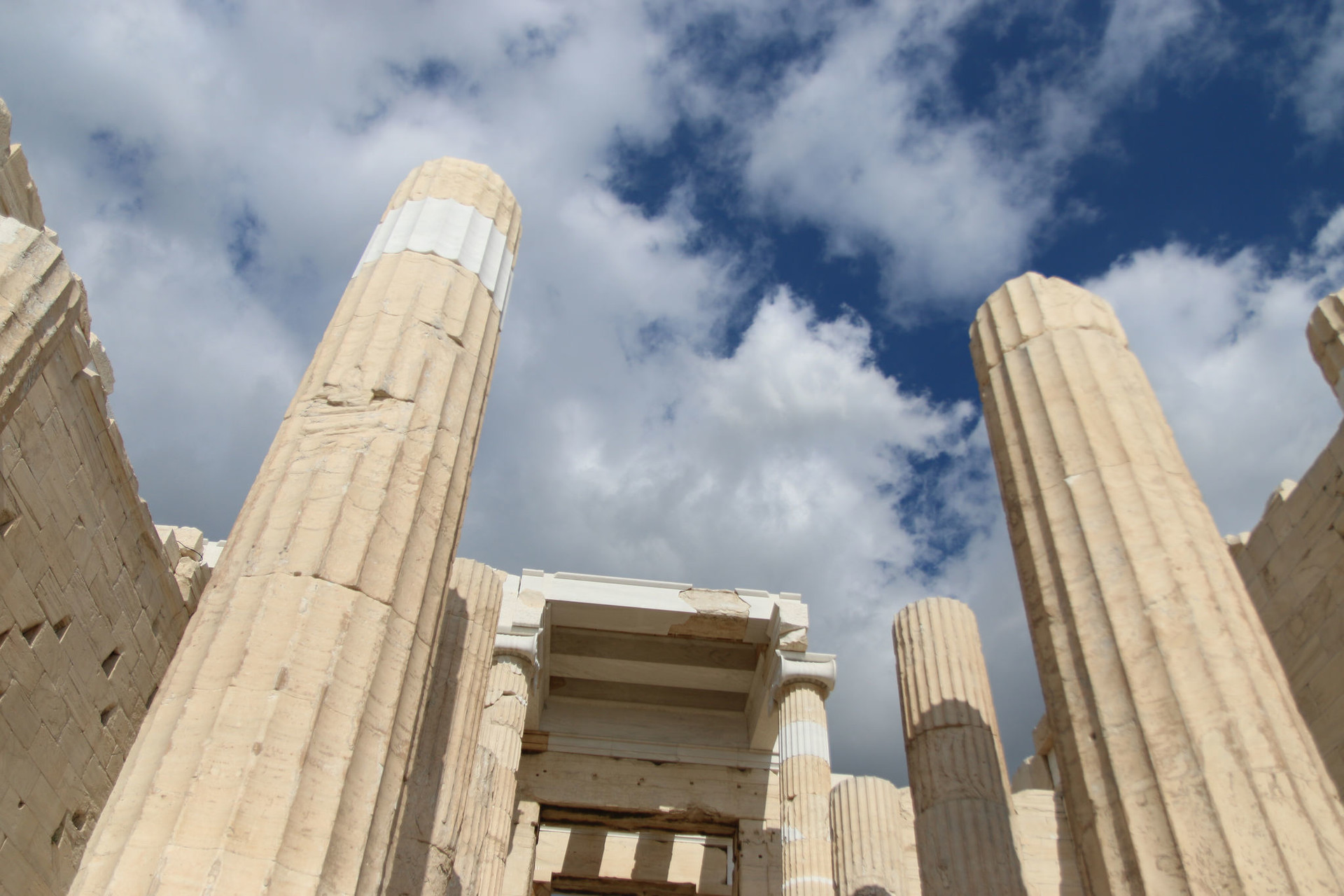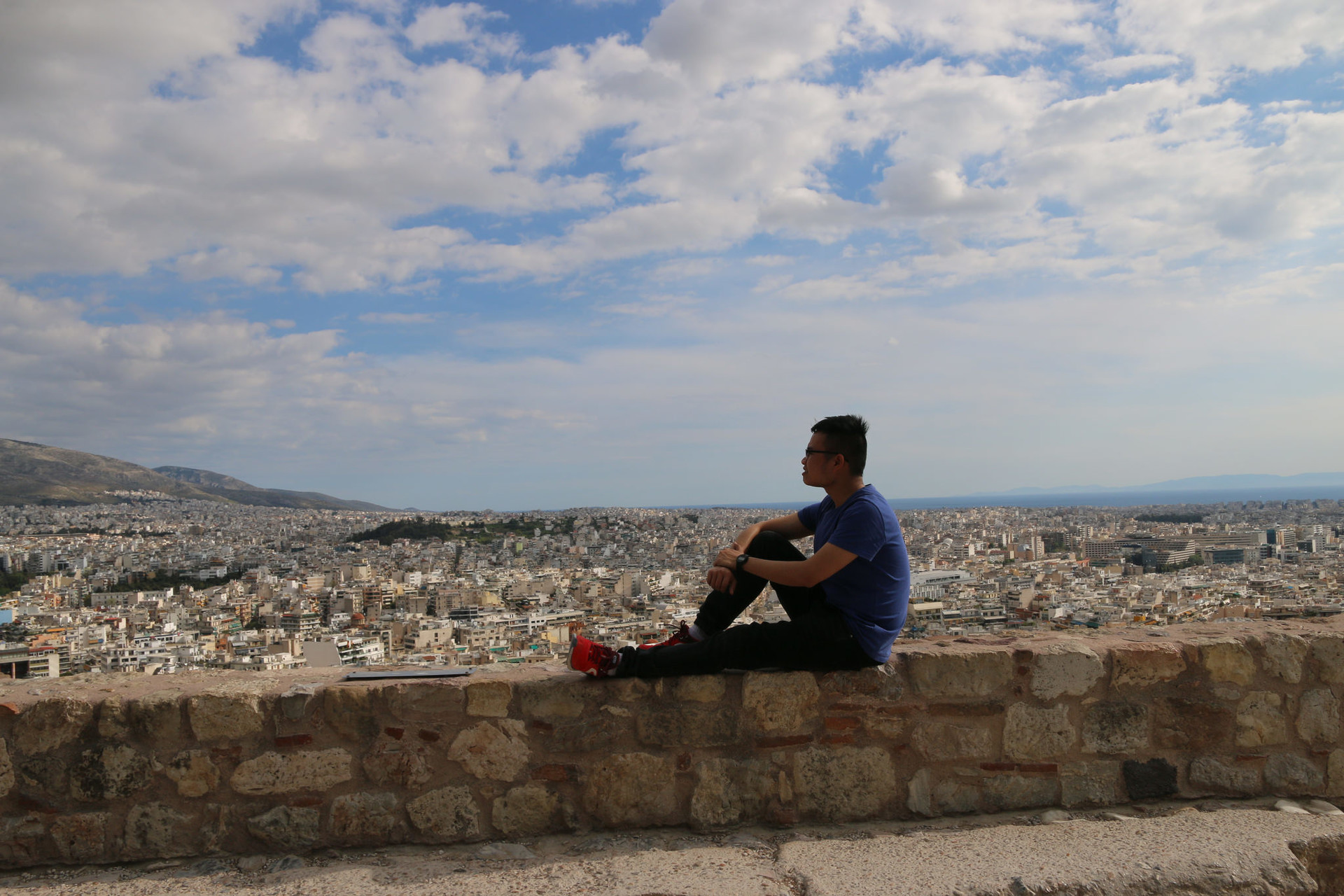Athens - Travel tips
Athens: the mythical city
I love Greece and I love Athens. It has a strange charm for me, I think perhaps because of its mythological name that gave me the feeling of entering the mythical world when I first stepped into the city.

In the past, both Athena and Poseidon wanted to be the patrons of Atikes. In honour of her reverence, Athena created an everlasting olive tree that grew over Atisi and Acropolos. On the other hand, Poseidon tried to overtake Athena by using his trident which he pierced through the ground in order to infiltrate the land, but as he was the god of the sea, the water was salty and could not be drunk.
Athena's gift seemed to the Athenians to be more useful, and that's how Athena became the protector of the land. As a result the land was renamed Athena.
It was when I heard the name Athens, that the image of an epic city filled with mysterious magical colours came to my mind.
In addition, I was attracted by all sorts of small details such as the streets, hills and historic sites from ancient Rome.
Before I visited Athens, many people, who have already been to Greece, advised me to visit some islands and ignore Athens, but I believe the city has also a lot of interesting things to offer.
And indeed, even though Athens is a small city, it left me with plenty of interesting experiences.
1. What is the best time to visit Athens?

Like other Mediterranean countries, such as Spain or Italy, Greece has a warm climate with a lot of sunshine and good weather throughout the year. We can go to Athens or other parts of Greece at any time of the year, but I think it is best to plan our trip between April and October, as from November till March it is winter, i. e. the rainy season.
I was also considering whether it is a good idea to go to Athens in July or August, as it is the peak of the tourist season, therefore, there are many visitors, Greece gets very crowded and prices are higher than usually.
Finally, I decided to visit Greece in April during Easter holidays.
2. How to get to Greece?
- From Vietnam: by plane. There are many airlines such as Vietnam Airlines, Qatar Airways, Etihad Airways, etc. The average ticket price ranges around $ 1 000 return trip. If you book during the peak months such as July, August or Easter time, the price is higher than usually. To find a cheap ticket you should check your fare regularly and plan 2-3 months ahead. You can also fly to another country in Europe first, sometimes you can buy return tickets for only $ 500.
- From European countries: You can choose some cheap airlines like Ryanair, Easyjet and try to look for tickets early in the peak season. The Greek company Aegean is also very good. It is not a cheap airline, so the service standard should be good, but you can get a price as good as the one offered by the cheap companies.
If you intend to take the train from EU countries to Greece, it will be more difficult because some domestic and international rail lines in Greece have been cancelled due to the economic crisis. Ticket prices are usually more expensive than airfares and there are not many options, but of course you can still find some trains to Athens via InterRail or Eurail.
3. Travelling to Athens
Travel from the airport to the city:
- Express bus: To get from the airport to the city, the easiest way is to go to the Arrival Hall of Athens Airport (which is quite small), where you will find shuttle bus into the city that runs continuously from 5. 00 AM till 12. 00 AM and costs € 5/6 one-way. You can get the ticket from a stand at the airport or buy it directly from the driver. There are four main routes: Kifissos KTEL (long-distance buses); Station (X93 - 65'); Syntagma (X95 - 60'); Port of Piraeus (Χ96 - 90') and Eliniko Metro Station (X97 - 45 '). The airport is about 20 km from the city center.
- Metro: take Metro Line 3 to the city centre, fare is € 6 single trip and € 10 return (valid for 48 hours).
- Taxi: You can get a taxi from the waiting areas at each of the three entrances of the airport, taxi fare to the city is € 35.
To travel from Athens to other islands (such as Santorini) the popular means of transport is to get a ferry from the meeting point at the central port of Piraeus. It is called ferry, but the Athens ferry boat is no different than a large ship carrying hundreds of people. From the city centre, it is easy to take the train to the port, or else you can get the direct bus X96 from the airport - it suits those who book their ferry ticket in advance.
To travel from Athens to the neighbouring inland areas, you can take the bus (the most popular and easiest way). The KTEL Bus Company for example has two main stops: Terminal A - Kifissou Avenue 100 and Terminal B - Liossion Street 260. If you prefer travelling by train, you can get it from the Peloponnese station about 1. 6 km away from Omonoia Square and head off to other European countries.

4. Moving around the city centre
The city of Athens is quite large, but not too big, so you can walk, or else take the metro, tram or taxi. As a student, I have enjoyed the student discount and paid only 70 cents per ticket.
- Metro: When I arrived, the metro system in Athens was already big enough to cover the entire city with many new lines built recently, so the trains were new and clean. The train runs from 5. 00 am to 12. 00 am every 5-10 minutes. The regular fare is € 0. 80 for single ticket, if need to move a lot, consider buying a day ticket (€ 3) or a weekly ticket (€ 10. 00).
- Tram: There are also tram lines with stops located around the city, with a single ticket for € 0. 80.
- Bus and Taxi: Buses in Athens are not very popular, as metro tends to be the main way of transportation. Taxis can be easily spotted as they are all painted yellow, the price is quite cheap and commuting is convenient.
5. Accommodation
When it comes to choosing a place to stay, for your convenience you should opt for a hostel or a hotel somewhere in the city centre, near to a metro station and restaurants. Accommodation prices in Athens are among the cheapest in Europe.
If you plan to stay in a hostel, you can book a room at the Zorbas Hostel, in which my sister, Hien, used to stay. The cheapest room is just €11-15 per bed. In order to book go to this page.
Another good option is Zeus Hostel. There is a common room, a separate kitchen for the tourists and a free access to the computer. This hostel is located in Victoria Boulevard in the heart of the city, just off the metro station, from which you can easily get to the Piraeus port.
I used to stay at Zeus Hostel and the room rates were not bad - just €10 per bed. Not only is it cheap, but it also has a great service and the rooms are clean. You can check it here.
Omonoia Square is also good quality and cheap. If you want to rent a room, it usually costs about €30 with breakfast included.
If you are looking for something cheaper, you can check out CouchSurfing or Airbnb or Hostelworld.
6. Food not to be missed!
- Gyros: the best and the cheapest meal you will get in Greece is Gyros - pitta bread with meat (chicken or pork), tomato sauce and potatoes. It looks like Doner Kebab, but tastes much better. It costs € 3/4 and one portion should be enough to satisfy your hunger. You can buy it at any bakery in the city.
- Yogurt: this Greek product is famous for its delicious fatty taste. Here in Athens Greek yogurt is used for making delicious Tzatziki to be served with Pitta bread or to be used while making a barbecue.
- Mutton recipes: lamb is one of the typical Greek ingredients used for making delicious dishes, such as lamb chops (Youvetsi) served with tomato sauce and a layer of delicious cheese.
Alternatively you can try some of the other dishes and products such as Fassolatha, Keftethes, Horta vrasta, Baklava, Greek nuts, olive oil, chocolate.
7. Places of interest
I find it to be quite interesting how the cities are planned in Greece, like a small, orderly and evenly distributed chessboard. The city is made up of hundreds of squares with cross paths, such as Omonoia Square. Athens is not too big. You can see the city in 1-2 days, or you can plan to stay longer if you want to explore also the attractions located in the suburbs. The city's attractions are reminiscent of the great period when Athens was a crowded, military city, one of the capitals of the ancient Roman civilisation.
But first of all, information on admission fees:
- Parthenon: €12
- Acropolis: €12
- National Archaeological Museum: €7
- Ancient Agora: €4
- Benaki Museum: €6
- New Acropolis Museum: €5
- Temple of Olympian Zeus: €12
The area around the Acropolis
Acropolis Hill is known as the heart of Athens, as it contains many relics of the Greek history. In Greek, the Acropolis means the high city. Where now only ruins of Acropolis have remained, thousands of years ago, there was a vast and enormous architectural treasure that brought with itself many stories and legends.
When I came to Acropolis, I simply walked around at the foot of the mountain, then slowly walked up the stairs and down the streets of the Old Quarter which gave me a strange feeling of mystery. In the morning I woke up, ordered some coffee and breakfast at a restaurant at the foot of the Acropolis and rested. Then I followed the steps and walked up the slopes, following narrow alleys that led me to the top of the hill. There is a kind of a balcony, small garden with many houses located on the side of the mountain, which looks like a miniature fairy world. The view of the city from this balcony is something difficult to describe.


Remnants of the Acropolis that cannot be ignored are the Parthenon, Erechthion Temple and Propylaea Temple Gate, entry costs 12 euros, this price is increased to 20 euros from March to October. The ticket includes visiting hills and monuments such as the Parthenon, Erechtheion, Hadrian's Library, Ancient Agora and Roman Agora, but it does not include museums in Athens - the city does not offer any "special package ticket" that would include all main attractions. You can go to the foothill to buy your tickets and remember to go early as in the mid-morning it gets very crowded.
- Parthenon temple: The main temple in the Acropolis, dedicated to the goddess Athena. It is made entirely of marble, but now it no longer retains the original shape and requires scaffolding support. You can admire from here the panoramic view of the city.
- Propylaea Gate: The gate is a system of doors with huge pillars and different buildings, most of which are destroyed and almost without roof. In the Propylaea Temple there is another temple dedicated to Athena Nike.
- Erechtheion Temple: This temple was built in the honour of two gods: Athena Polias and Poseidon Erechtheus. The highlight of the monument is a hall with pillars in a form of female figures, representing the slave girls of Caria.
- Ancient Agora and Roman Agora: These monuments, dispersed around the Acropolis, are quite similar to the Roman Forum in Rome. There is a lot to see, so reserve enough time for visiting and exploring.
- Old Town Plaka: This street is located just below the Acropolis and is a great place for you to take a stroll and experience Greek culture. The street is filled with shops selling traditional handicrafts. There are also many places to eat. Beware of the barbecue smell! You will not be able to ignore it and will most probably give in to temptation of trying one of the favourite dishes of the local people.

The National Archaeological Museum
It is home to many antiques of the ancient Greek culture including jewellery, sculptures, pottery and even 2000-year-old computer, i. e. the Antikythera Device. The place is filled with historical knowledge and everything you will see here will make you realise how developed ancient Greece was.
In addition to the National Museum, in Athens, there are also other museums that you can visit, such as the Kanellopoulos Museum or the New Acropolis Museum.

Photo gallery
Content available in other languages
- Polski: Ateny - podróżnicze wskazówki
- Español: Consejos para viajar a Atenas
Want to have your own Erasmus blog?
If you are experiencing living abroad, you're an avid traveller or want to promote the city where you live... create your own blog and share your adventures!
I want to create my Erasmus blog! →























Comments (0 comments)